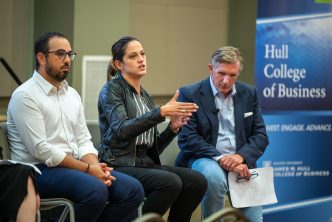Dean Richard Franza’s column appeared in the Sunday, June 6 edition of the Augusta Chronicle. The post can be viewed here.
If you are a regular reader of this column, you know that there are some movies I really like, and not many of those are of very recent vintage. Any time I hear the term “usual suspects,” it brings to mind two of my all-time favorites.
The first of those is the 1942 classic “Casablanca.” Near the end of the movie, Rick Blaine (Humphrey Bogart) shoots Nazi Major Strasser to allow Victor and Ilsa’s plane to take off. The only witness is the Vichy police captain, Louis Renault, played by Claude Rains. To protect Rick from being accused of the shooting, Renault tells his fellow policemen to “round up the usual suspects” (i.e., those habitually suspected or arrested following a crime in Casablanca).
Similarly, in the 1995 movie “The Usual Suspects,” five career criminals are each arrested as suspects in a truck hijacking in which none of them had actually participated. Ultimately, the five criminals attempt to get revenge for being “rounded up” by working together to pull off a $3 million emerald heist.
However, in both “Casablanca” and “The Usual Suspects,” “rounding up the usual suspects” did not lead to finding the right person or people for certain positions. We often make the same mistake and tend to “round up the usual suspects” – i.e., the same types of people we have always hired, with the same skill sets, who went to the same schools, with similar demographics.
While some people believe this is a tried-and-true way of hiring, I do not think it works. It tends to limit the diversity of skills and ideas that can make business more successful. However, such hiring methods are even more difficult in the current environment in which many businesses are finding it difficult to find workers.
To increase your likelihood of finding good workers, you need to look beyond the “usual suspects,” and in today’s column, I’ll recommend where to look.
Avoid categorizing jobs by gender
Often, hiring managers are missing out on at least half of their qualified pool by focusing on the gender that often dominates or is stereotypical of that field. Women are often not considered for jobs that are typically male-dominated, particularly those in science and engineering; aviation; computer hardware and software; physical jobs such as construction and firefighting; trades such as carpentry, plumbing, electrical work and welding; and executive leaders. On the other hand, men are typically overlooked for jobs such as nurses; preschool and elementary school teachers; retail salespeople; and administrative assistants.
The bigger issue clearly appears to be limiting opportunities for women as opposed to men. Surprisingly, we should start looking toward professional sports teams who have recently demonstrated more openness to hiring women in positions as coaches, scouts and team executives as a positive example of expanding the pool of potential employees.
Think old, think young
As you try to expand your potential hiring pool, I would strongly recommend considering both older and younger workers.
Older people bring much to the table. Because we are living longer, the pool of older people is growing faster than those of younger people. They bring significant experience and maturity that can positively affect your business and the younger people in your business. Also, while research shows that raw mental horsepower declines after age 30, knowledge and expertise (the main predictors of job performance) are enhanced even beyond age 80.
While hiring older people positively expands your pool, so does hiring younger people. Young people bring energy and fresh perspective to your business. Hiring young people also helps your community by helping develop its workforce. I learned my initial work ethic and responsibility through my paper route and odd jobs that appear to be in shorter supply today. You should strongly consider taking on an intern through the Metro Augusta Chamber of Commerce’s Students2Work program as a way of hiring younger workers and developing our workforce.
Consider veterans
We are fortunate here in Augusta to have a large military presence with Fort Gordon. Every month, soldiers, young and older, separate or retire from military service. Veterans are a great source of employees. They are highly dependable, responsible, well-trained and very coachable. They are used to working in stressful situations and staying cool under pressure. While you might not always see the direct correlation of a veteran’s skillset to your position or industry, when you hire a veteran, you are hiring a great worker with the ability to train and adapt to any situation.
Diversity wins
While I once believed you should not just hire a diverse workforce for diversity’s sake, I have been convinced otherwise over the years. I always try to hire the best candidate available for an open position, but diversity is always a good thing to consider. Diversity of ideas and experiences typically brings success to your business.
So, as you look to hire workers in this challenging environment, do not think like Capt. Renault or Keyser Soze, and look beyond the usual suspects!







